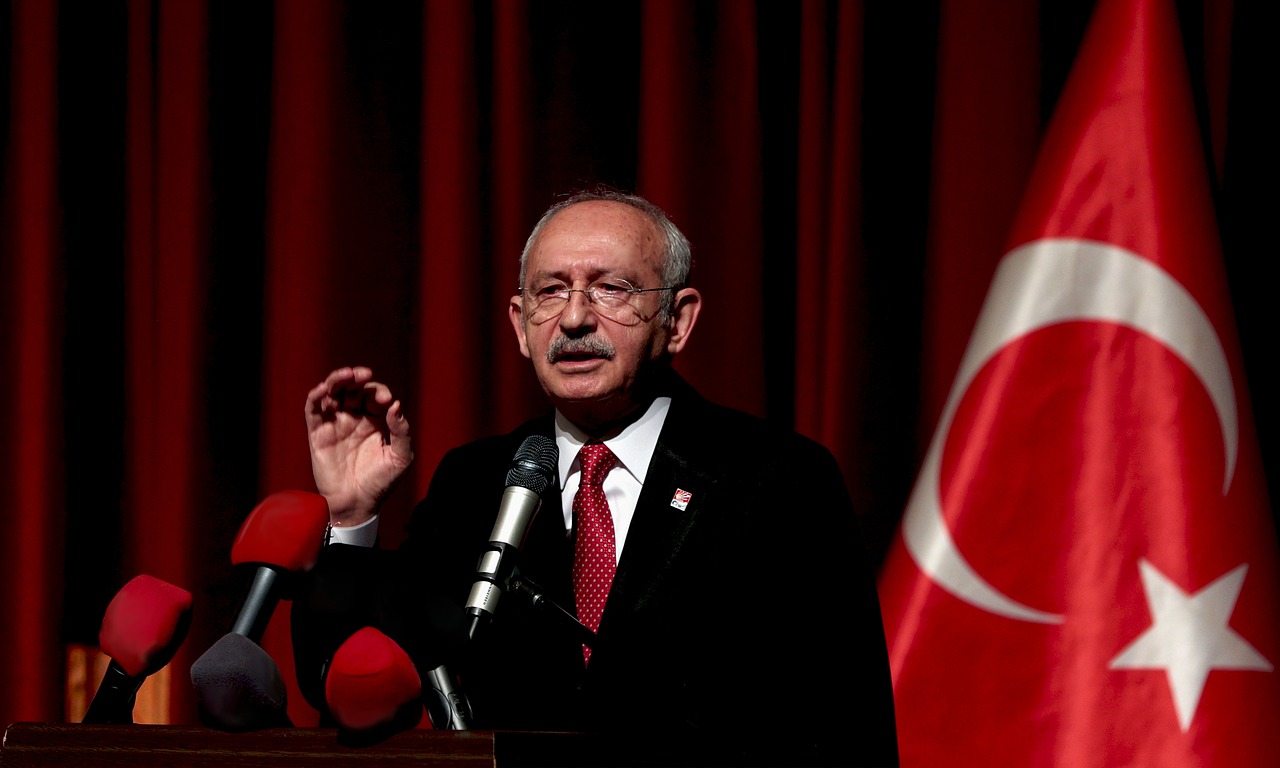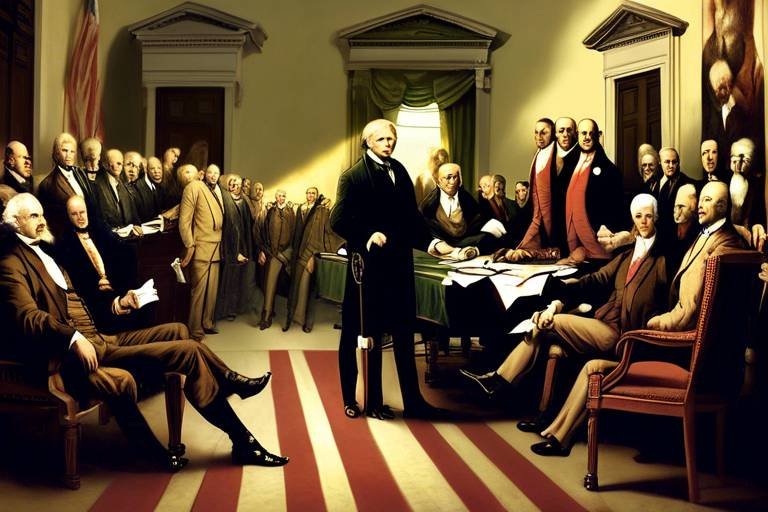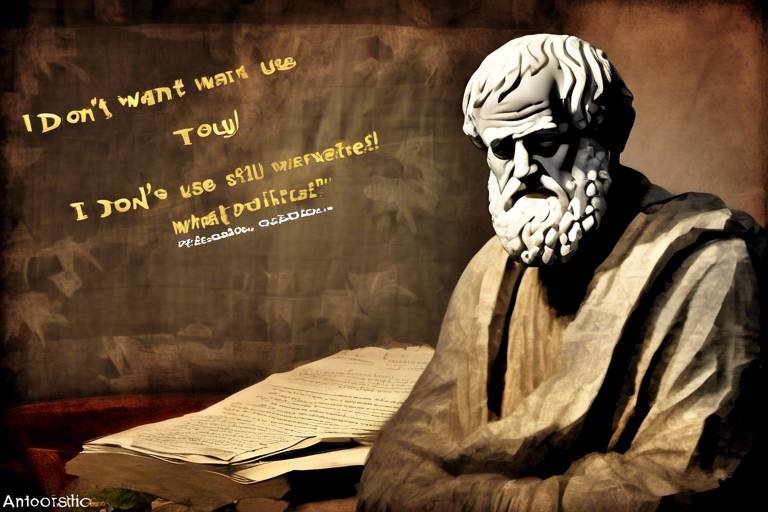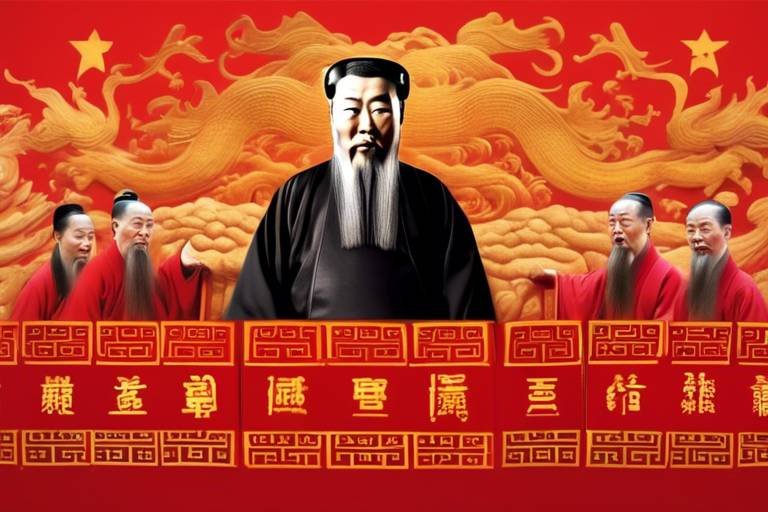Cross-cultural Explorations in Political Philosophy
In a world that is increasingly interconnected, the exploration of political philosophy across different cultures becomes not just fascinating but essential. Political philosophy, at its core, is the study of how societies govern themselves and the ethical frameworks that guide these governance structures. But how does this differ from one culture to another? What influences these diverse perspectives? This article delves into the rich tapestry of political thought that spans the globe, examining how various cultural contexts shape our understanding of governance, social justice, and ethical frameworks.
Imagine walking through a marketplace where ideas from different corners of the world are exchanged like goods. Each stall represents a unique political philosophy, reflecting the history, values, and struggles of its culture. From the democratic ideals of the West to the communal traditions of indigenous societies, each perspective offers a lens through which we can better understand the complexities of human interaction and governance. The beauty of political philosophy lies in its ability to adapt and evolve, influenced by the unique narratives and experiences of different peoples.
As we embark on this journey, we will uncover the historical roots of political thought, examining the contributions of key thinkers who have shaped our understanding of governance. We will analyze various political systems worldwide, comparing democratic, authoritarian, and hybrid models, and exploring how cultural values impact these structures. Each section will illuminate the intricate dance between culture and political philosophy, revealing how deeply intertwined they are.
Moreover, we will dive into the concept of democracy as interpreted across cultures, shedding light on the challenges and successes faced in different regions. Indigenous perspectives on governance will provide a refreshing contrast to Western political thought, showcasing traditional systems that prioritize community engagement and cultural values. In doing so, we will not only broaden our understanding of political philosophy but also appreciate the richness that different cultural contexts bring to the table.
As we navigate through these discussions, it’s essential to recognize the ethical frameworks that underpin political philosophies. We will analyze how cultural beliefs influence moral reasoning and political theories, exploring the delicate balance between individual rights and societal responsibilities. In the age of globalization, we cannot ignore the impact of cross-cultural exchanges on traditional ideas, leading to new interpretations of governance and ethics.
By the end of our exploration, we hope to have provided a comprehensive overview of cross-cultural political philosophy, highlighting the diversity of thought that exists in our world. This journey is not just an academic exercise; it is an invitation to engage with the complexities of governance and social justice in a way that respects and celebrates cultural differences. So, let’s dive in and discover the fascinating world of political philosophy through a cross-cultural lens!
- What is political philosophy? Political philosophy is the study of fundamental questions about the state, government, politics, liberty, justice, and the enforcement of a legal code by authority.
- How does culture influence political philosophy? Culture shapes the values, beliefs, and practices that inform political systems and theories, leading to diverse interpretations of governance and social justice.
- What are some examples of different political systems? Political systems can range from democratic systems where citizens have a voice, to authoritarian regimes where power is concentrated in a single authority.
- Why is it important to study cross-cultural political philosophy? Studying cross-cultural political philosophy allows us to appreciate the diversity of thought and practice in governance, fostering a deeper understanding of global issues.

The Foundations of Political Philosophy
Political philosophy has roots that stretch back to ancient civilizations, with its foundations laid by thinkers who grappled with the complexities of human society, governance, and morality. Imagine sitting in the dusty streets of Athens, where Socrates posed challenging questions about justice and virtue, or in the serene gardens of ancient China, where Confucius emphasized moral governance and social harmony. These early philosophers not only shaped their respective cultures but also laid the groundwork for political thought that resonates across the globe today.
Throughout history, key figures have emerged, each contributing unique perspectives influenced by their cultural contexts. For instance, Plato’s idealism in "The Republic" contrasts sharply with Aristotle’s empirical approach, which focused on the practical aspects of governance. Similarly, in the East, the teachings of Laozi and Zhuangzi introduced a philosophy centered around natural order and spontaneity, offering a stark contrast to the more rigid structures found in Western political thought. This rich tapestry of ideas showcases how cultural backgrounds inform philosophical inquiries and lead to diverse interpretations of governance.
To better understand these foundational ideas, let’s take a closer look at some of the pivotal thinkers and their contributions:
| Philosopher | Key Contribution | Cultural Context |
|---|---|---|
| Socrates | Questioning ethics and morality | Ancient Greece |
| Plato | Theory of Forms and ideal states | Ancient Greece |
| Aristotle | Empirical observation and political realism | Ancient Greece |
| Confucius | Moral governance and social harmony | Ancient China |
| Laozi | Taoism and natural order | Ancient China |
These philosophers, among many others, have significantly influenced contemporary political thought. Their ideas about justice, power, and the role of the individual versus the state continue to spark debates in modern political discourse. For example, the question of how to balance individual freedoms with societal needs echoes the dilemmas faced by thinkers like Rousseau and Mill, whose works are still relevant in today's discussions about democracy and rights.
Moreover, the evolution of political philosophy reflects the dynamic nature of cultures themselves. As societies evolve, so do their philosophical inquiries. The integration of ideas from different cultures, especially in our increasingly globalized world, enriches the dialogue around governance and ethics. This cross-pollination of ideas not only challenges existing frameworks but also invites new interpretations that can lead to innovative solutions for contemporary issues.
In essence, the foundations of political philosophy are not merely historical artifacts; they are living dialogues that continue to shape our understanding of governance and society. As we delve deeper into the comparative analysis of political systems and ethical frameworks, it becomes clear that these foundational ideas serve as a lens through which we can examine and understand the complexities of modern political landscapes.
- What is political philosophy? Political philosophy is the study of fundamental questions about the state, government, politics, liberty, justice, and the enforcement of a legal code by authority.
- Who are some key figures in political philosophy? Some key figures include Socrates, Plato, Aristotle, Confucius, and John Locke, each contributing unique perspectives that have shaped political thought.
- How does culture influence political philosophy? Culture shapes the values, beliefs, and practices that inform political philosophies, leading to diverse interpretations of governance and ethical frameworks.
- Why is understanding political philosophy important? Understanding political philosophy helps us engage critically with political systems and ideologies, fostering informed citizenship and ethical governance.

Comparative Political Systems
When we take a step back and look at the world, it's fascinating to see how different political systems shape our societies. From the bustling streets of democracies to the more controlled environments of authoritarian regimes, each system has its own flavor and unique set of challenges. What drives these differences? Well, it's often the cultural values and historical contexts that mold the governance structures we see today. In this section, we will dive into the intricacies of various political systems, comparing democratic, authoritarian, and hybrid models, while exploring how cultural nuances influence citizen participation and governance.
Democracy, for instance, is often viewed through a Western lens, emphasizing individual freedoms and electoral participation. However, as we explore different regions, we discover that democracy can take on many forms. In some cultures, community consensus plays a vital role, which might seem foreign to those accustomed to a more individualistic approach. This leads us to the idea of hybrid systems, where elements of both democracy and authoritarianism coexist. Countries like Turkey and Venezuela exemplify this blend, showcasing how cultural contexts can lead to unique political landscapes.
To understand these systems better, let’s take a look at the following table, which outlines key characteristics of different political systems:
| Political System | Characteristics | Examples |
|---|---|---|
| Democracy | Free and fair elections, individual rights, rule of law | United States, Canada, India |
| Authoritarianism | Concentration of power, limited political freedoms, state control | North Korea, Saudi Arabia, China |
| Hybrid Systems | Combination of democratic and authoritarian practices | Turkey, Venezuela, Russia |
As we dissect these systems, it’s crucial to note that cultural values are not merely background noise; they are the heartbeat of governance. For example, in many Eastern cultures, the concept of collectivism can lead to a preference for systems that prioritize community welfare over individual rights. This can create a stark contrast to Western ideals, where personal freedom often takes center stage. Understanding these cultural lenses can provide us with a richer, more nuanced view of how political systems function and evolve.
Moreover, citizen participation varies widely across these systems. In democratic nations, citizens are often encouraged to engage actively in political discourse, while in authoritarian regimes, such engagement might be met with repression. Yet, even in hybrid systems, we see a spectrum of participation that reflects the underlying cultural attitudes toward governance. This brings us to a critical question: how do these varying levels of engagement impact the effectiveness and legitimacy of each system?
In summary, the comparative analysis of political systems reveals a complex interplay between culture and governance. By recognizing these differences, we can better appreciate the diverse political landscapes that shape our world today. So, the next time you hear about a political system, remember that it’s not just about laws and regulations; it's also about the rich tapestry of culture that influences every decision made within it.
- What are the main types of political systems? The main types include democracies, authoritarian regimes, and hybrid systems.
- How does culture influence political systems? Culture shapes values and beliefs that determine how governance is structured and how citizens participate.
- Can a country change its political system? Yes, countries can transition between different systems, often influenced by social movements, economic changes, or external pressures.

Democracy Across Cultures
Democracy is often hailed as a universal ideal, a shining beacon of freedom and equality that many nations aspire to achieve. However, the interpretation and implementation of democratic principles can vary significantly across different cultures. This variance raises an intriguing question: can democracy truly be one-size-fits-all, or does it need to adapt to the unique cultural fabric of each society? In exploring this topic, we find that cultural narratives, historical experiences, and social structures play pivotal roles in shaping what democracy looks like in various contexts.
To illustrate this point, let’s consider how democracy manifests in distinct regions of the world. In Western nations, democracy is often characterized by competitive elections, a strong emphasis on individual rights, and a separation of powers. These elements are seen as essential for ensuring that the government remains accountable to the people. However, in many Eastern cultures, the concept of democracy may intertwine with communal values that prioritize harmony and collective well-being over individualism. For instance, in some Asian countries, democratic practices may exist alongside a strong sense of social responsibility, where the community's needs often take precedence over personal freedoms.
Moreover, the challenges faced by democracies can differ widely based on cultural context. In regions with a history of colonialism, the struggle for democratic governance is often intertwined with issues of identity and autonomy. Countries in Africa and Latin America, for example, frequently grapple with the legacies of colonial rule, which can complicate the establishment of democratic institutions. These nations may adopt democratic frameworks, but their effectiveness can be undermined by factors such as corruption, economic inequality, and social unrest. Thus, the journey towards democracy is not merely about adopting a set of practices; it involves navigating a complex landscape of historical and cultural realities.
Interestingly, some cultures have developed unique interpretations of democracy that challenge conventional Western notions. For instance, indigenous governance systems often emphasize consensus-building and collective decision-making, which can be seen as a form of democratic practice that diverges from the majority-rule model prevalent in Western democracies. These systems highlight the importance of community engagement and respect for tradition, demonstrating that democracy can be flexible and responsive to local values.
In summary, the concept of democracy is not monolithic; it is a dynamic and evolving idea shaped by the cultures in which it is practiced. Understanding these diverse interpretations is crucial for fostering a more inclusive dialogue about governance and social justice. As we continue to explore the intersections of democracy and culture, we must ask ourselves: how can we learn from these varied experiences to create a more equitable and just political landscape for all?
- What is democracy? Democracy is a system of government in which power is vested in the people, who rule either directly or through freely elected representatives.
- How does culture influence democracy? Culture shapes the values, beliefs, and practices that inform how democracy is understood and implemented within a society.
- Can democracy work in all cultures? While democracy can be adapted to fit different cultural contexts, its success often depends on the historical and social realities of each society.
- What are some challenges to democracy in various cultures? Challenges include corruption, economic inequality, and social unrest, which can hinder the effectiveness of democratic institutions.

Indigenous Perspectives on Governance
When we think about governance, we often picture structured political systems with formal institutions, laws, and regulations. However, challenge this conventional notion, offering a rich tapestry of ideas rooted in community, tradition, and a profound connection to the land. For many indigenous cultures, governance is not merely about power or authority; it is about maintaining harmony within the community and with the environment. This holistic approach emphasizes the importance of relationships, both among people and between people and nature.
Indigenous governance systems often prioritize consensus-building over adversarial politics. In many communities, decisions are made collectively, reflecting the values and needs of all members. This contrasts sharply with Western models that frequently lean towards majority rule, which can marginalize minority voices. In indigenous governance, every voice matters, and the goal is to reach a solution that everyone can support, fostering unity and shared responsibility. This approach not only strengthens community bonds but also ensures that decisions are sustainable and considerate of future generations.
One of the most striking features of indigenous governance is its deep-rooted connection to ancestral knowledge and traditions. Elders play a crucial role as custodians of this knowledge, guiding the community in decision-making processes. Their wisdom, accumulated over generations, helps to navigate contemporary challenges while honoring the past. This intergenerational dialogue is vital, as it ensures that governance is not just about the present but also about preserving cultural identity and heritage for future generations.
Furthermore, indigenous governance often incorporates spiritual beliefs and practices, recognizing the sacredness of the land and the interconnectedness of all living beings. For instance, many indigenous communities view the land as a relative rather than a resource to be exploited. This perspective fosters a sense of stewardship, where the community is responsible for caring for the land, ensuring its health, and maintaining its integrity. This contrasts with exploitative practices seen in some modern governance systems, where short-term gains often overshadow long-term sustainability.
To illustrate the diversity of indigenous governance, consider the following table that highlights various indigenous governance principles across different cultures:
| Indigenous Group | Key Governance Principle | Community Role |
|---|---|---|
| Navajo | Consensus Decision-Making | Community Elders |
| Maori | Whanaungatanga (Kinship) | Collective Responsibility |
| Inuit | Consensus and Respect for Elders | Community Engagement |
| Ainu | Connection to Nature | Stewardship |
This table illustrates how different indigenous groups emphasize governance principles that reflect their unique cultural contexts, yet share common themes of community engagement and respect for the environment. Understanding these perspectives can enrich our comprehension of governance as a whole, highlighting the need for inclusivity and respect for diverse viewpoints. As we navigate the complexities of modern political systems, integrating indigenous wisdom can offer valuable insights into creating more equitable and sustainable governance structures.
- What is indigenous governance?
Indigenous governance refers to the systems and practices that indigenous communities use to make decisions, manage resources, and maintain social order, often emphasizing communal values and ancestral traditions. - How does indigenous governance differ from Western governance?
Indigenous governance typically prioritizes consensus and community involvement, whereas Western governance often relies on majority rule and formal institutions. - Why is ancestral knowledge important in indigenous governance?
Ancestral knowledge provides wisdom and guidance for decision-making, ensuring that cultural identity and heritage are preserved for future generations.

Western vs. Eastern Political Thought
The debate between Western and Eastern political thought has long captivated scholars and laypeople alike, as it unravels the rich tapestry of human governance and societal organization. At its core, this comparison reveals fundamental differences in how authority, freedom, and the role of the state are perceived across cultures. In the Western context, political philosophy has often emphasized individualism, where the rights of the individual are paramount. Thinkers like John Locke and Thomas Hobbes championed the idea that individuals possess inherent rights that must be protected by the state. This perspective fosters a framework where personal liberty is often seen as the bedrock of a just society.
Conversely, Eastern political thought, as exemplified by Confucianism and Taoism, tends to prioritize the collective well-being over individual rights. In these traditions, the harmony of the community and the moral duties of individuals towards one another are emphasized. For instance, Confucian ideals stress the importance of filial piety and social harmony, where the individual is seen as part of a larger social fabric. This leads to a governance model that often favors consensus and community engagement over the competitive individualism found in Western systems.
When we dive deeper into these philosophical waters, we can observe how these contrasting views shape the political landscapes of their respective cultures. For example, in many Western democracies, political discourse often revolves around the protection of civil liberties and the empowerment of the individual. Citizens are encouraged to voice dissent and challenge authority, which is seen as a hallmark of a healthy democracy. In contrast, in several Eastern societies, political stability and social order may take precedence over individual expression. Here, the government often plays a more paternalistic role, guiding citizens towards what is considered the greater good.
To illustrate these differences more clearly, consider the following table:
| Aspect | Western Political Thought | Eastern Political Thought |
|---|---|---|
| Focus | Individual Rights | Collective Well-being |
| Authority | Contractual and Limited | Paternalistic and Guiding |
| Role of the State | Protector of Freedoms | Promoter of Social Harmony |
| Political Participation | Active Dissent Encouraged | Consensus and Community Engagement |
This table succinctly captures the essence of the contrasting political philosophies. It’s fascinating to see how these foundational beliefs shape not only governance but also the everyday lives of individuals within these societies. The Western emphasis on rights can lead to vibrant political debates and activism, while the Eastern focus on community can foster a sense of belonging and stability.
Ultimately, understanding these differences is not just an academic exercise; it has profound implications for how we engage with one another in an increasingly interconnected world. As globalization continues to blur the lines between East and West, the dialogue between these two traditions becomes ever more crucial. By appreciating the strengths and weaknesses of both perspectives, we can cultivate a richer, more nuanced understanding of political philosophy that respects the diverse ways in which humans organize their societies.
- What are the main differences between Western and Eastern political thought?
Western thought typically emphasizes individual rights and freedoms, while Eastern thought focuses on collective well-being and social harmony.
- How do these differences affect governance?
In Western systems, citizens often have more freedom to dissent and challenge authority, whereas Eastern systems may prioritize stability and community engagement.
- Can these philosophies coexist in a globalized world?
Yes, as globalization fosters cross-cultural exchanges, there is potential for a synthesis of ideas that can enrich political discourse.

Social Justice in Different Cultures
When we talk about social justice, it's like opening a treasure chest filled with diverse perspectives, each reflecting the unique values and histories of different cultures. Imagine walking through a bustling marketplace, where each stall represents a different culture's approach to justice. Some cultures prioritize equality, while others might emphasize community welfare or individual rights. The way social justice is understood and pursued can vary dramatically, influenced by historical contexts, economic conditions, and cultural narratives.
For instance, in many Western societies, social justice is often framed around the concept of individual rights and liberties. Think of the civil rights movements that have shaped nations, advocating for equal treatment under the law and fighting against systemic discrimination. In these contexts, social justice is frequently pursued through legal reforms, policy changes, and grassroots activism. The focus is on ensuring that every individual has the opportunity to succeed, often encapsulated in the idea of the American Dream.
On the other hand, in many Indigenous cultures, social justice is less about individual rights and more about the collective good. Here, the emphasis is on community, tradition, and the interconnectedness of all members. For example, many Indigenous groups prioritize land rights and environmental stewardship, viewing these issues as integral to their identity and survival. This perspective often leads to a holistic approach to justice, where the well-being of the community and the health of the land are seen as inseparable.
Moreover, in cultures influenced by collectivist values, such as those in parts of Asia, social justice may be viewed through the lens of harmony and social cohesion. In these societies, the focus might be on maintaining balance and stability, often resulting in policies that promote social welfare and community support. The idea is that when the community thrives, the individual benefits as well. It's a beautiful dance of interdependence, where everyone plays a role in lifting each other up.
However, the pursuit of social justice is not without its challenges. In many regions, systemic inequalities, historical injustices, and economic disparities complicate the landscape. For example, in countries grappling with post-colonial legacies, the fight for social justice often involves addressing deep-rooted issues of colonialism and oppression. Activists in these contexts might focus on reparations, land reclamation, and the restoration of cultural practices that were suppressed.
In summary, social justice is not a one-size-fits-all concept. It is a rich tapestry woven from the threads of different cultural narratives, historical experiences, and societal values. Understanding these diverse perspectives is crucial, as they not only inform local practices but also contribute to the global dialogue on justice. As we navigate this complex landscape, we must ask ourselves: how can we learn from each other to create a more just world for everyone?
- What is social justice? - Social justice refers to the fair distribution of resources, opportunities, and privileges within a society.
- How do different cultures view social justice? - Different cultures interpret social justice through their unique historical, social, and economic lenses, leading to varied approaches and priorities.
- Why is understanding cultural perspectives on social justice important? - Understanding these perspectives helps foster dialogue and collaboration, allowing for more inclusive and effective solutions to social issues.

Ethical Frameworks in Political Philosophy
When we dive into the realm of ethical frameworks in political philosophy, we uncover a tapestry woven from diverse cultural beliefs and moral reasoning. Ethics, at its core, is about understanding what is right and wrong, and how these judgments influence political theories and governance structures. Different societies have developed unique ethical paradigms that reflect their historical experiences, social norms, and cultural narratives. For instance, in many Western societies, the emphasis tends to be on individual rights and liberties, emphasizing the significance of personal freedom as a cornerstone of ethical reasoning. In contrast, Eastern philosophies often prioritize the collective good, focusing on community well-being and harmony. This divergence raises fascinating questions: How do these differing ethical frameworks shape the governance of nations? And what implications do they have for social justice and human rights?
To illustrate this point further, let's take a look at some key ethical frameworks that have emerged across cultures:
| Ethical Framework | Key Characteristics | Cultural Context |
|---|---|---|
| Utilitarianism | Focus on the greatest good for the greatest number | Common in Western thought, particularly in liberal democracies |
| Deontology | Emphasis on duty and rules | Rooted in Western philosophy, notably in Kantian ethics |
| Confucianism | Focus on relationships, social harmony, and moral integrity | Predominantly found in East Asian cultures |
| Ubuntu | Emphasizes communal relationships and mutual care | Originates from African cultures, reflecting community values |
These frameworks not only guide individual moral choices but also shape the laws and policies that govern societies. For example, a nation that adopts a utilitarian approach might prioritize policies that maximize overall welfare, even if it means sacrificing certain individual rights. On the other hand, a society influenced by deontological ethics may uphold strict adherence to laws and regulations, regardless of the outcomes. This can sometimes lead to tensions between the needs of the individual versus the collective, raising profound ethical dilemmas.
Moreover, the interplay between rights and responsibilities is a crucial aspect of these ethical frameworks. In many cultures, the understanding of rights is intertwined with the notion of responsibilities to the community. This is particularly evident in indigenous philosophies, where the well-being of the community often takes precedence over individual desires. As we reflect on these ethical dimensions, we must ask ourselves: How do these frameworks influence our understanding of justice? And how can they inform our approach to contemporary global challenges?
As globalization continues to blur the lines between cultures, the dialogue surrounding ethical frameworks in political philosophy becomes increasingly vital. Cross-cultural exchanges challenge traditional ideas and encourage new interpretations of governance and ethics. This evolution prompts us to reconsider our own ethical beliefs and their implications for global citizenship. In this dynamic landscape, understanding and respecting diverse ethical perspectives is not just an academic exercise; it is essential for fostering mutual respect and cooperation in an interconnected world.
- What are ethical frameworks in political philosophy? Ethical frameworks are systems of moral reasoning that guide political theories and governance, influenced by cultural beliefs and historical contexts.
- How do different cultures impact ethical frameworks? Different cultures prioritize various ethical principles, such as individual rights versus collective good, shaping their political systems and policies.
- Why is understanding ethical frameworks important? Understanding these frameworks helps us navigate complex social justice issues and fosters respect for diverse perspectives in an increasingly globalized world.

Rights and Responsibilities
When we think about rights and responsibilities, it's essential to understand that these concepts are like two sides of the same coin. They are intertwined, shaping the very fabric of our societies and influencing how individuals interact with one another and with their governments. Rights are often seen as the privileges that individuals possess, while responsibilities are the duties that come with those privileges. But have you ever stopped to consider how these ideas vary across cultures? It's fascinating to see how different societies interpret and prioritize these concepts.
In many Western cultures, rights are often viewed as inherent and universal. Think of the Bill of Rights in the United States, which outlines fundamental freedoms such as speech, religion, and assembly. However, this perspective can sometimes lead to a notion of individualism that prioritizes personal freedoms over community welfare. On the other hand, in many Eastern cultures, rights are often seen in relation to societal harmony and collective well-being. For instance, the concept of “collective rights” is prevalent in various Asian societies, where the emphasis is placed on the community's needs rather than just individual desires.
It's also interesting to note how historical contexts shape these perceptions. In post-colonial societies, the struggle for rights often intertwines with the fight for recognition and respect for cultural identities. Here, the responsibility to uphold and honor one's heritage becomes paramount. A great example of this can be seen in indigenous communities worldwide, where the rights of the land and the rights of the people are deeply connected. Traditional governance systems often emphasize responsibilities towards the community and the environment, reflecting a holistic view of rights.
To illustrate this further, consider the following table that compares the understanding of rights and responsibilities in different cultural contexts:
| Cultural Context | Rights | Responsibilities |
|---|---|---|
| Western Societies | Individual rights, often seen as universal and inalienable. | Focus on civic duties, but can sometimes overlook community obligations. |
| Eastern Societies | Rights often tied to social harmony and collective well-being. | Emphasis on responsibilities to family and community. |
| Indigenous Cultures | Rights of the land and natural resources are paramount. | Strong sense of duty to protect the environment and cultural heritage. |
As we navigate through these complex ideas, one question often arises: how do we strike a balance between rights and responsibilities? It's crucial to recognize that while rights empower individuals, responsibilities ensure that those rights are upheld and respected within the community. This delicate balance is vital for fostering a healthy society where everyone can thrive.
In conclusion, the interplay between rights and responsibilities is a dynamic and evolving discourse that varies significantly across cultural landscapes. By understanding these differences, we can foster greater empathy and cooperation among diverse societies, paving the way for a more just and equitable world.
- What are individual rights? Individual rights are the liberties and privileges that every person possesses, often enshrined in law.
- How do responsibilities relate to rights? Responsibilities are duties that individuals have towards others and society, ensuring that rights are respected and upheld.
- Why is cultural context important in understanding rights and responsibilities? Cultural context shapes how societies view and prioritize rights and responsibilities, leading to diverse interpretations and practices.
- Can rights and responsibilities conflict? Yes, there can be conflicts, especially when individual rights infringe upon the rights of others or the community as a whole.

Globalization and Political Philosophy
The phenomenon of globalization has had a profound impact on political philosophy, reshaping how we understand governance, ethics, and cultural interactions across the globe. As the world becomes increasingly interconnected, the exchange of ideas transcends borders, leading to a rich tapestry of political thought that is both diverse and dynamic. This exchange prompts us to ask: how do these interactions challenge traditional political ideologies? Are we witnessing a convergence of values or a clash of cultures?
One of the most significant effects of globalization is the emergence of transnational political movements. These movements often advocate for issues that resonate across multiple cultures, such as human rights, environmental sustainability, and social justice. For instance, the global climate movement has united activists from various nations, each bringing their unique cultural perspectives to the table. This collaboration illustrates how globalization can foster a shared sense of responsibility and urgency in addressing global challenges.
However, the impact of globalization is not uniformly positive. It also raises questions about cultural imperialism, where dominant cultures impose their political philosophies on others. This can lead to a dilution of local traditions and values, creating tension between global norms and indigenous practices. For example, many indigenous communities struggle to maintain their governance systems in the face of external pressures to adopt Western-style democratic frameworks. This tension highlights the need for a nuanced understanding of how globalization affects local political philosophies.
Additionally, globalization has led to the rise of hybrid political systems, where elements of different governance models coexist. Countries like India exemplify this blending, as they navigate a complex political landscape that incorporates both democratic principles and traditional practices. This hybridization raises important questions about the legitimacy and effectiveness of governance in a globalized world. Are these systems more resilient, or do they risk becoming fragmented?
To further understand the relationship between globalization and political philosophy, we can explore a few key themes:
- Cross-Cultural Dialogues: Globalization facilitates discussions between diverse political philosophies, allowing for the exchange of ideas that can lead to enriched governance models.
- The Role of Technology: The internet and social media have transformed how political ideas spread, enabling grassroots movements to gain international visibility and support.
- Ethical Dilemmas: As cultures interact, differing ethical frameworks can clash, prompting debates about universal values versus cultural relativism.
In conclusion, globalization is not just a backdrop for political philosophy; it actively shapes and reshapes it. As we navigate this complex landscape, it is crucial to remain open to the myriad influences that different cultures bring to the table. By embracing this diversity, we can forge a more inclusive understanding of governance that respects both global imperatives and local traditions.
Q: How does globalization affect local political philosophies?
A: Globalization can lead to both the blending of ideas and the imposition of dominant cultures, creating tensions between global norms and local traditions.
Q: What role do transnational movements play in political philosophy?
A: Transnational movements advocate for shared issues across cultures, fostering collaboration and a sense of global responsibility.
Q: Are hybrid political systems effective?
A: Hybrid systems can be resilient as they incorporate diverse governance elements, but they also risk fragmentation if not managed carefully.
Frequently Asked Questions
- What is cross-cultural political philosophy?
Cross-cultural political philosophy explores how different cultures interpret and apply political ideas and principles. It examines the diverse perspectives on governance, social justice, and ethics, highlighting how historical and cultural contexts shape these views.
- How do historical roots influence political philosophy?
The historical roots of political philosophy are crucial as they provide the foundational ideas and frameworks developed by key thinkers. Each philosopher's work is often a reflection of their cultural context, which influences their views on authority, governance, and individual rights.
- What are the main types of political systems compared in the article?
The article compares democratic, authoritarian, and hybrid political systems. It emphasizes how cultural values impact governance structures, citizen participation, and the overall effectiveness of these systems in addressing societal needs.
- How is democracy interpreted differently across cultures?
Democracy is perceived through various lenses depending on cultural contexts. While some cultures may prioritize individual freedoms, others might focus on community welfare. The article discusses both the challenges and successes faced by different regions in implementing democratic principles.
- What insights do indigenous governance systems provide?
Indigenous governance systems often reflect a deep connection to cultural values and community engagement. They contrast with Western political thought by emphasizing collective decision-making and sustainability, providing unique insights into alternative forms of governance.
- What are the key differences between Western and Eastern political thought?
Western political thought often emphasizes individualism, freedom, and the role of the state, while Eastern philosophies may focus more on community harmony and collective responsibility. The article highlights these fundamental differences and their implications for governance.
- How do different cultures define social justice?
Social justice is defined variably across cultures, shaped by historical contexts, economic conditions, and cultural narratives. The article explores how these factors influence the pursuit of social justice and the different methodologies employed in various societies.
- What ethical frameworks are discussed in relation to political philosophy?
The article analyzes how cultural beliefs inform ethical reasoning and the development of political theories. It emphasizes the balance between individual rights and societal responsibilities, showcasing how these concepts are prioritized differently across cultures.
- How does globalization affect political philosophy?
Globalization has a profound impact on political philosophy by facilitating cross-cultural exchanges that challenge traditional ideas. This leads to new interpretations of governance and ethics, as cultures interact and influence one another in an increasingly interconnected world.



















